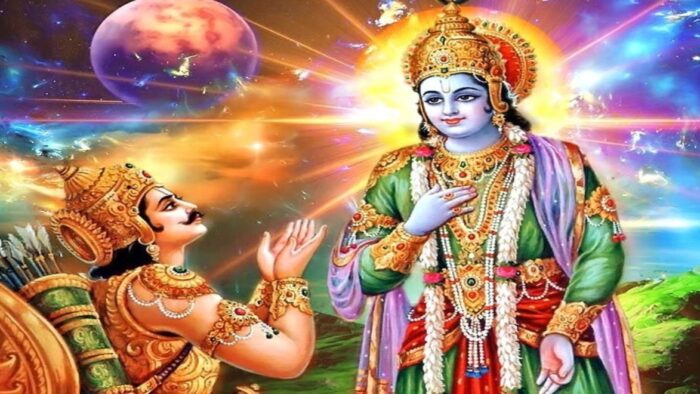One of the most valuable, deep, and profound contributions of India to the world civilization has been the Bhagavad Gītā, a text that truly encapsulates the essence of Hindu philosophy and Sanātana Dharma.
The Bhagavad Gītā forms a part of the itihāsa Mahābhārata and has been included in the Bhīṣma Parvan of the same text. The counsel given by Bhagavān Śrī Kṛṣṇa to Arjuna at the beginning of the great Bharata war on the battlefield of Kurukṣetra forms the subject matter of the Gītā.
Though Arjuna is the recipient in the original discourse, the Gītā as a body of philosophical teachings of Bhagavān Śrī Kṛṣṇa, the greatest statesman, and philosopher in the Indic tradition, can be imbibed by each one of us. Over the last 1200 years, philosopher-teachers belonging to various schools of thought have written detailed commentaries or bhāṣyas on the Gītā.
Ādi Saṅkarācārya (788-820 CE), the pioneering proponent of Advaita Vedānta is the first historically recorded commentator of the Gītā. After him, Rāmānujācārya, Madhvācārya, Jñaneśvara, Madhusūdana Sarasvatī, Viśvanātha Cakravartī, Lokamānya Tiḷak, Śrī Aurobindo, R.D. Ranade, Bhaktivedānta Svāmī Prabhupāda and Svāmī Raṅganāthānanda can be considered to be some of the notable commentators on the Gītā.
Madhusūdana Sarasvatī was an Advaitin in the philosophical tradition of Ādi Śaṅkarācārya and lived sometime during the 16th century CE. He was a native of Bengal but spent a significant part of his life at Vārāṇasī. Though an Advaitin, he was a great devotee of Bhagavān Śrī Kṛṣṇa. His commentary on the Gītā is known as the Gūḍhārtha Dīpikā and has a considerable focus on the principle of bhakti.
On the other hand, Ādi Śaṅkarācārya’s Gītā Bhāṣya is clearly oriented towards the principle of jñāna. Nevertheless, Madhusūdana Sarasvatī had great reverence for Ādi Saṅkarācārya and acknowledged his Gitā Bhāṣya in his own commentary.
This article tries to understand the term lokasaṁgraha through the interpretations given by Ādi Śaṅkarācārya and Madhusūdana Sarasvatī in their respective commentaries.
The term lokasaṁgraha appears in the 20th śloka of the 3rd adhyāya titled Karma Yoga of the Bhagavad Gītā.
कर्मणैव हि संसिद्धिमास्थिता जनकादय: |
लोकसंग्रहमेवापि सम्पश्यन्कर्तुमर्हसि || 3.20
karmaṇaiva hi sansiddhim āsthitā janakādayaḥ |
loka-saṁgraham evāpi sampaśhyan kartum arhasi ||
Meaning: By performing their prescribed duties, King Janaka and others attained perfection. You should also perform your work to set an example for the good of the world. (Translation by Swami Mukundananda)
Ādi Saṅkarācārya interprets the term lokasaṁgraha as the act of ensuring the welfare of the world. The Ācārya comments that well known Kṣatriya kings like Janaka and Aśvapati Kekaya of yore (who find mention in the Upaniṣadic texts) attained liberation by continuing to do their prescribed work and duties i.e. promoting the welfare of the world.
The Ācārya writes,” If they (i.e. Janaka and Aśvapati Kekaya) are held to have attained right perception due to their past operative works (Prārabdha Karma), directed to the world’s welfare, they attained perfection while still doing works i.e. without renouncing them. This is the sense of this verse”. (Commentary 20.1, English translation by A.G. Krishna Warrier, pp 116-117).
The Ācārya further elaborates that Arjuna may think that ancient Kṣatriyas like Janaka and others performed their duties because they were oblivious to the Self and so a man who has attained the right perception (samyaka darśana) need not follow their example.
However, since Arjuna cannot escape his prārabdha karma he must work for the welfare of the world (lokasaṁgraha) i.e. prevent people from resorting to the wrong path (lokasya unmārgapravṛttinivāraṇam lokasaṁgraḥ) (Commentary 20.2, English translation by A.G. Krishna Warrier, p.117).
Madhusūdana Sarasvatī’s interpretation of lokasaṁgraha differs slightly from that of Ādi Saṅkarācārya. He says that Kṣatriyas like Janaka and Ajātaśatru (ruler of Kāśī) who were renowned in the Vedas and Śmṛtis attained steadfastness in knowledge through śravaṇa but also through karma i.e. action itself and not by abandoning action.
Though these Kṣatriya kings were men of wisdom and well versed in the knowledge of Brahman, they did not swerve from the path of action. So Arjuna who was also a Kṣatriya should perform his duty of fighting though he may be a seeker of the supreme knowledge.
The order of monasticism meant for the Brāhmaṇas and not for the class of Kṣatriyas and Vaiṣyas. The king has to ensure that each of the classes performs their respective duties. One of the main duties of a Kṣatriya, especially if he is a king is to uphold the respective duties of the classes.
As per the bhāṣya of Madhusūdana Sarasvatī, lokasaṁgraha implies making people adhere to do their respective duties and making them refrain from following the wrong path. Arjuna who has been born as a Kṣatriya on account of his prārabdha karma should emulate Kṣatriyas like Janaka and concentrate on performing his duty i.e. to ensure that people follow their duties and do not take the wrong path.
The Student’s Sanskrit-English Dictionary compiled by Vaman Shivaram Apte gives different meanings of the word ‘saṁgraha’ of which two are ‘supporting’ and ‘exerting’ which could be relevant for the term lokasaṁgraha as used in the bhāṣyas of Ādi Śaṅkarācārya and Madhusūdana Sarasvatī.
It was certainly the king’s premier duty to support his people and exert himself for this purpose. This support was to be given by working for the welfare of the people through various state measures and making the subjects perform their respective duties so that there would be order and stability in the society.
In the opinion of scholars like R.N. Dandekar, one of the principal teachings of the Bhagavad Gītā is that man’s main duty is the promotion of lokasaṁgraha. Dandekar understands this term to include the stability, solidarity and progress of the society (Dandekar 1979, 201). He further says this can be achieved by the “ethical interdependence of it’s (i.e. society’s) various constituents” (Ibid).
Both Ādi Śaṅkarācārya and Madhusūdana Sarasvatī emphasize on the performance of assigned duties of a person by which the stability of the society can be achieved. The king who is a Kṣatriya is the key figure in this and it was his prime responsibility to promote the welfare of his people and preserve the stability of the society by seeing to it that every member performs assigned duties.
Narendra Nath Law has listed some of the major welfare activities of a ruler in Ancient India. The king had to pay attention to the economic condition of his domain and undertake such projects which will promote the economic welfare of his people. He had to take care of the poor and the needy and establish institutions of public utility. Most importantly he had to maintain the varṇa dharma i.e. to safeguard the functions of the four varṇas (Law 1921).
There is a particular incident in the Śānti Parvan of the Mahābhārata where Arjuna narrates to Yudhiṣṭhira the rebuke given by Janaka’s queen to him. After the end of the Bharata War, Yudhiṣṭhira was greatly perturbed and decided to forsake his right to the Hastināpura throne and live life as a renunciate.
It is at this time that Arjuna tells him how in the past, Janaka, the king of Videha had abandoned his kingship and taken recourse to the life of an ascetic. His chief queen sternly reminds him of his duties as a king and how it is adharmic for a Kṣatriya ruler like Janaka to neglect his responsibilities especially when the lives of so many others are dependent on him.
She compares him to a water fountain and a tree laden with fruits- objects which respectively fulfill the thirst and hunger of the needy (Mahābhārata, Śānti Parvan, Rājadharmanuśāsana Parvan, 18.17).
In the Śānti Parvan, Bhīṣma tells Yudhiṣṭhira that a king must take care of his subjects like his own children and grandchildren but while administering justice he should be fair and impartial (Mahābhārata, Śānti Parvan, Rājadharmanuśāsana Parvan,69.27).
A king must encourage professions like agriculture, protection of cows, trade, and make more people take up these professions (Mahābhārata, Śānti Parvan, Rājadharmanuśāsana Parvan 88.27).
The essence of the counsel given in the Rājadharmānuśāsana Parvan of the Śānti Parvan by Bhīṣma to Yudhiṣṭhira is that a king should promote the welfare of his people by adhering to Rājadharma i.e. protecting the people from any kind of danger, collecting only that much tax from the people as prescribed by dharma, administering fair and impartial justice, implementing public utility works, punishing the offenders and keeping the royal kośa or treasury full.
In the Indic tradition, the king is considered an indispensable medium for the welfare of the people and for the protection of the social, economic, cultural, religious, and political functions and institutions of the society.
The 94th adhyāya of the Ayodhyā Kāṇḍa of the Vālmīki Rāmāyaṇa includes Rāma’s counsel to Bharata on the duties of an ideal king and the code of conduct which he must adhere to in his public and personal life.
This is the advice Rāma gives to Bharata when the latter comes to the forest to inform Rāma about the demise of their father Daśaratha and to bring Rāma back to Ayodhyā and instate him as the king. The advice touches upon religious, political, war-related, espionage, socio-economic, and judicial matters as well as those matters concerning the protection of animals, diplomacy, and the king’s personal qualities.
Rāma tells Bharata that it was the duty of the king to see that all the four varṇas performed their respective duties and that the Brāhmaṇas, Kṣatriyas, and Vaiṣyas are engaged in their respective vocations. Rāma inquires about the mines in Ayodhyā while advising Bharata and about the reception of income from mines.
The state funds which were sourced from just taxes and tributes were to be utilized in building and strengthening the army. Rāma clearly tells Bharata that people who are engaged in agriculture and animal husbandry should be looked after by him and he has to ensure that they are truly happy.
Agricultural lands should be in the best state, free from attacks of wild animals. Women should be protected and attention must be given to their comforts. The elderly and children had to be cared for by the king.
The Kauṭilya Arthaśāstra highlights the promotion of the economic welfare of the people by the king. The king had to always keep his treasury full as an empty treasury would put more economic pressure on people.
The king was responsible for controlling trade, commerce, and industries. The king instructed his officers to look after the mines and industries as well as monitor the market prices of goods so that the traders could not cheat the people.
In case a trader tried unfair trade practices he was punished. Further, the king had to ensure a prosperous trade and provide for the vārtā or livelihood of the people. Kauṭilya considered it imperative on the part of the king and the state to provide subsidies for the growth of trade, agriculture, irrigation, mines, and cattle.
The state officials were also responsible for starting a few industries. In other words, the Arthaśāstra envisaged a welfare state- an expansion of the idea of lokasaṃgraha.
The Arthaśāstra also states that the king had to ensure that every person behaved as per his svadharma i.e. his or her respective duties which were assigned by the society (Kāryānuśāsanene Svardharmasthāpana, Kauṭilya Arthaśāstra, 1.7.1).
The ideas of lokasaṁgraha as expressed by Ādi Śaṅkarācārya and Madhusūdana Sarasvatī find a reflection in the Manu Smṛti as well though the Smṛti is a much older work than the bhāṣyas of the two philosophers. The Manu Smṛti has an entire adhyāya dedicated to the qualities and responsibilities of a king.
The Manu Smṛti hints that one of the reasons behind the creation of the position of a king was to protect the varṇas and the āśramas which were engaged in performing their respective duties (Manu Smṛti 7.35). The same Dharmaśāstra text lays great stress on the use daṇḍa (which can be very loosely translated as punishment or force) by the king against the anti-social elements in the society for its welfare.
The text also states clearly that the king must look after his subjects like a father thus ensuring their well-being (Manu Smṛti 7.80). Further, looking after the subjects is one of the first responsibilities of a king, apart from not retreating from a battle and serving the Brāhmaṇas (Manu Smṛti 7.88). Another śloka in the Manu Smṛti states:
Kṣatriyasya Paro Dharmaḥ Prajānāmeva Pālanam |
Nirdiṣṭaphalabhoktā Hi Rājā Dharmeṇa Yujyate || 7.144)
Taking care of the subjects, protecting them is the greatest responsibility of a Kṣatriya and only that king is endowed with dharma who enjoys the fruit as enjoined in the śāstras.
The whole thrust of this adhyāya of the Manu Smṛti is on the welfare of the subjects by the king. A wide range of matters including the personal discipline of a king, the virtues he must imbibe, his refraining from all kinds of indulgences, matters related to the saptāṅgas (Svāmin or king, Amātya or minister, Janapada or the land and the people inhabiting it, Durga or fortress, Kośa or treasury, Daṇḍa or army and Suhrud or allies) of the rājya and his adherence to Vaidika rituals have all been dealt meticulously with the objective to secure the good of the subjects or prajā.
We thus understand that the term lokasaṁgraha as interpreted by Ādi Śaṅkarācārya and Madhusūdana Sarasvatī implies that it is the onus of the ruler, as the leader of the society to ensure its welfare and one of the most effective ways for this is to make people perform their assigned duties to avoid friction and chaos in the society.
Other ancient texts like the Vālmiki Rāmāyaṇa, Mahābhārata, Kauṭilya Arthaśāstra, and Manu Smṛti resonate with the interpretations of these two philosophers. We can also say that at the foundation of these interpretations lay the Indic ethos which is enshrined in these texts. The Indic tradition right from the Vaidika times vouched for an elected and responsible king and a tyrant was severely criticized.
Our ancient texts enlist ways of how a society could get rid of a despot. The king, as the head of the state, had to direct all his energy for the welfare of his people and not for the mere enjoyment of power and position. Though the Gītā is a deeply philosophical text, it has also dealt with matters concerning svadharma and rājadharma because along with bhakti and jñāna, the essence of the Bhagavān Śri Kṛṣṇa’s message is also karma.
If we see the live histories of both Ādi Śaṅkarācārya and Madhusūdana Sarasvatī, they were both virakta yogins but they themselves strove for the welfare of the societies in which they lived. The former strengthened India’s spiritual unity while the latter fought hard against Islamic persecution. Their divine lives truly epitomize the ideal of lokasaṁgraha.
(The author is grateful to her friend Ms. Kanakavalli Santhanam, a scholar of Sanskrit and Indic Studies for her inputs.)
References
Primary Texts
- Kangle R.P (Trans.), Kautiliya Arthashastra, Mumbai: Maharashtra Rajya Sahitya Sanskruti Mandal, 2011(Reprint)
- Pandeya, Ramnarayanadatta, Shastri (Trans.) Mahabharata, Volume V. Gorakhpur: Gita Press, V.S. 2072
- Shastri, Rakesh (Ed and Trans.), Manusmrtih, Delhi: Vidyanidhi Prakashan, 2017.
- Samkaracarya, Adi and Warrier, Krishna A.G. (trans.), Srimad Bhagavad Gita Bhasya, Chennai: Sri Ramakrishna Math, 2014.
- Sarasvati, Madhusudana and Gambhirananda, Swami (Trans.), Bhagavad Gita with the annotation Gudhartha Dipika, Mayavati: Advaita Ashram, 2013 (3rd Reprint)
- Shrimad Valmiki Ramayana, Part I, Gorakhpur: Gita Press, 2017 (12th Reprint)
Secondary Texts
- Dandekar R.N., Insights into Hinduism, New Delhi: Ajanta Publications, 1979.
- Law, Narendra Nath, Ancient Indian Polity, Oxford: Clarendon Press, 1921.
Dictionary
Apte, Vaman, Shivram, The Student’s Sanskrit-English Dictionary, Delhi: Motilal Banarasidass Pvt. Ltd., 1970 (13th Reprint 2012)
Web Source
https://www.holy-bhagavad-gita.org/
Featured Image Credits: Samacharnama
Disclaimer: The opinions expressed in this article belong to the author. Indic Today is neither responsible nor liable for the accuracy, completeness, suitability, or validity of any information in the article.










